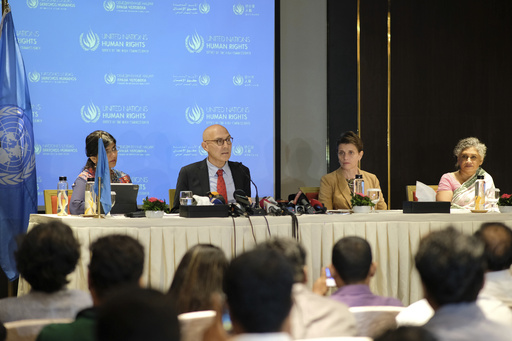
DHAKA, Bangladesh — A senior official from the United Nations has made a strong appeal for a comprehensive investigation into all instances of homicide and other human rights infringements that occurred during the turbulent period surrounding the ousting of former Prime Minister Sheikh Hasina.
Volker Türk, the U.N. High Commissioner for Human Rights, wrapped up a two-day official visit on Wednesday, coinciding with the efforts of an interim government led by Nobel laureate Muhammad Yunus to restore stability in Bangladesh.
Sheikh Hasina’s 15-year administration came to an end when she fled to India on August 5, following a student-initiated protest that escalated into a widespread anti-government movement in July. The protests resulted in the deaths of hundreds of students, security personnel, and others; and, in the aftermath of Hasina’s departure, numerous assassinations—including that of her supporters—occurred due to acts of revenge or mob violence sweeping across the country.
In response to an official request for an investigation from the Yunus-led government, Türk has dispatched a fact-finding mission to scrutinize these violent events. Notably, Hasina herself had also requested an inquiry into the fatalities.
Türk emphasized the critical importance of examining claims regarding assaults on minority groups within the nation, notably the Hindu community, which has been actively protesting in the streets, advocating for their safety and other essential rights.
“The pursuit of justice for the severe violence against protesters and other individuals—particularly children—who lost their lives or suffered serious injuries in July and August is of utmost priority,” he asserted at a press conference held in Dhaka, the capital city.
During his time in Bangladesh, Türk engaged in discussions with Yunus along with other governmental figures, student representatives, civil society activists, and injured protesters still undergoing medical treatment in hospitals.
He commended the Yunus-led administration for its commitment to pursuing significant reforms within the nation. “Real opportunities exist, and there are certainly elevated expectations for fundamental progress—toward a new style of governance, development, and economic policies centered on human rights, built from the momentum of recent movements,” he remarked.
Türk further expressed, “It is essential that this time justice is served. We must ensure that reforms are lasting and effective to prevent the recurrence of the oppressive practices witnessed over the past decades.”
In addition, journalist organizations in Bangladesh have reported that several journalists sympathetic to Hasina are facing fabricated charges including murder and other felonies, and they are calling for the release of those who have been detained and imprisoned in recent months due to such allegations.
The Paris-based organization Reporters Without Borders (RSF) highlighted the urgent need for the release of detained journalists and the dismissal of baseless charges against them in August.
Türk underscored the necessity for transparency and accountability in the legal processes regarding the filing of charges.
